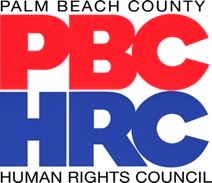City acts to ban retailer discrimination
By Tony Doris Palm Beach Post Staff Writer
The impetus
came from calls to the Palm Beach County Human Rights Council from young
black men, that shopkeepers would follow them around stores or demand
extra ID. The nickname for their assumed offense: "Shopping while
Black."
The gay and lesbian community also felt the sting of wedding cake bakers or photographers who refused to serve them.
The
push-back came Monday night with a unanimous final vote of the city
commission: an amendment to West Palm Beach's human rights law, banning
discrimination by an expanded list of "public accommodations," from
restaurants and bars to schools, bakeries, hotels, theaters, spas, gyms
and any other "establishment, service, place or building which offers,
sells or otherwise makes available any good, service, facility,
privilege or advantage."
The amendment, approved without discussion, followed the passage of a similar change to Palm Beach County's law.
 "It's the biggest expansion in civil rights in the city and county in
decades," Rand Hoch, president of the Human Rights Council, said
Tuesday.
"It's the biggest expansion in civil rights in the city and county in
decades," Rand Hoch, president of the Human Rights Council, said
Tuesday.
Hoch said he is working with Sen. Joe Abruzzo, D-Wellington, to propose a state law with the same prohibitions.  Florida laws are "really bad, really primitive" and may take years to change, he said.
Florida laws are "really bad, really primitive" and may take years to change, he said.
 Florida laws are "really bad, really primitive" and may take years to change, he said.
Florida laws are "really bad, really primitive" and may take years to change, he said.
West Palm
adopted its Equal Opportunity Ordinance in 1994 and has updated it from
time to time. But the city law was modeled after civil rights
legislation that dated from the 1960s and that focused on lunch
counters, hotels, and bars and theaters but didn't reflect the changing
face of discrimination, Hoch said.
"All these
years since then, when they've tweaked them, they've never really looked
where discrimination was taking place. And it's taking place almost
everywhere business occurs... We saw nothing in the laws in Palm Beach
County that dealt with consumer racism," Hoch said.
Now, he
says, whether you're a black customer or a gay couple and someone says
they are not going to bake your wedding cake, "that's illegal," Hoch
said.
It took
about eight months for the city and county to consider and research the
proposed changes. There was little resistance from the business
community, he said. Extending those protections statewide could take
three or four years, he said.
The West Palm amendment represents the county's 101st legal change that deals with LGBT rights, by his count.
"As a civil
rights lawyer, this is one of the things I'm most proud of having West
Palm Beach do, because it covers so many people."



